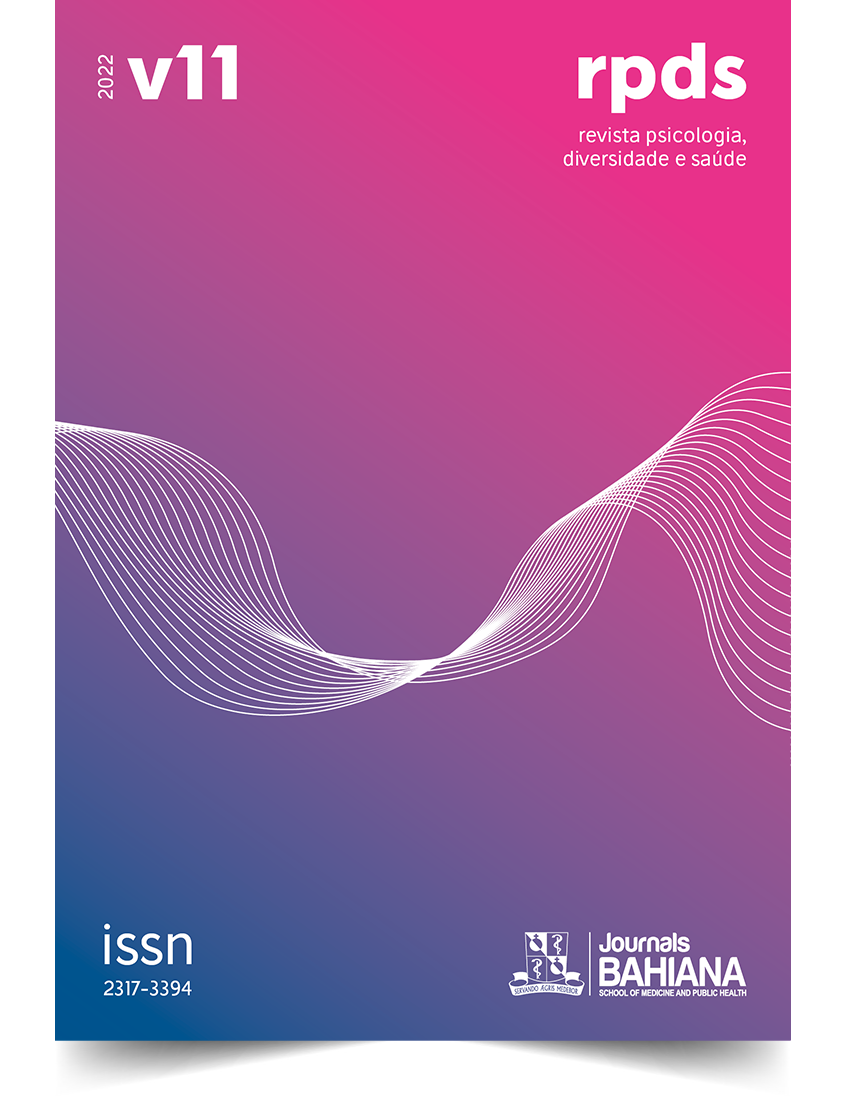Maternal device in relation to the condition of breastfeeding women living with HIV
DOI:
https://doi.org/10.17267/2317-3394rpds.2022.e4095Keywords:
Gender Vulnerability, HIV, BreastfeedingAbstract
INTRODUCTION: Many roles are socially assigned to women in the context of motherhood and especially in the breastfeeding process. In the context of women living with HIV/AIDS, breastfeeding and the risk of vertical transmission of HIV point to particular implications. OBJECTIVE: This study aims to discuss the impacts of gender devices and technologies related to the experiences of women living with HIV and in the process of breastfeeding. METHODS: For this purpose, based on a qualitative and exploratory design, a literature review was conducted in Scielo, Biblioteca Virtual em Saúde (BVS) and Biblioteca Digital de Periódicos platforms, allowing the exploration of issues in the light of productions on the theme and making possible reflections about the topics addressed. We also sought to select and include books and other classical works relevant to this specific theme. RESULTS: Seven publications were selected, according to the relationship with the objectives of this study, in addition to other works with relevance to the theme in question, which revealed the existence of ambivalent feelings such as anger, sadness, feelings of guilt, and the need to protect the child from the (im)possibility of transmitting HIV. FINAL CONSIDERATIONS: The search indicates that there is a wide possibility of establishing historically, socially, and culturally the relationship between gender technology, maternal device, and vertical transmission of HIV.
Downloads
References
Almeida, J. A. G. (1999). Amamentação: um híbrido natureza-cultura. Editora Fiocruz. https://books.scielo.org/id/rdm32
Badinter, E. (2011). O conflito: a mulher e a mãe. Record. (Texto originalmente publicado em 2010).
Carvalho, F. T., & Piccinini, C. A. (2006). Maternidade em situação de infecção pelo HIV: Um estudo sobre os sentimentos de gestantes. Interação em Psicologia, 10(2), 345-355. http://dx.doi.org/10.5380/psi.v10i2.7693
Carvalho, F. T., & Piccinini, C. A. (2008). Aspectos históricos do feminino e do maternal e a infecção pelo HIV em mulheres. Ciência e Saúde coletiva, 13(6), 1889-1898. http://dx.doi.org/10.1590/S1413-81232008000600024
Cortez, A. F. L. (2010). O discurso da revista Crescer na normatização da sexualidade feminina na gravidez [Dissertação de mestrado, Universidade Federal de Pernambuco]. Repositório digital da UFPE. https://repositorio.ufpe.br/handle/123456789/8503
Costa, J. F. (1983). Ordem Médica e Norma Familiar. Graal.
Ewbank, T. (1976). Vida no Brasil ou Diário de uma Visita à Terra do Cacaueiro. Itatiaia/EDUSP.
Fischer, R. M. (1997). O estatuto pedagógico da mídia: questões de análise. Educação & Realidade, 22(2), 59-79. https://seer.ufrgs.br/index.php/educacaoerealidade/article/view/71363
Foucault, M. (1990). Tecnologías del yo y otros textos afines. [Tecnologias do eu e outros textos relacionados]. Paidós. (Texto publicado originalmente em 1988).
Foucault, M. (1996). Microfísica do poder. Graal. (Texto originalmente publicado em 1978).
Kalil, I. R., & Aguiar, A. C. (2017). Silêncios nos discursos pró-aleitamento materno: uma análise na perspectiva de gênero. Estudos feministas, 25(2), 637-660. https://doi.org/10.1590/1806-9584.2017v25n2p637
Knaak, S.J. (2006). The Problem with Breastfeeding Discourse. [O problema do discurso da amamentação]. Canadian journal of public health, 97(5), 412-414. https://doi.org/10.1007/BF03405355
Koller, S. H., Couto, M. C. P. P., & Von Hohendorff, J. (2014). Manual de produção científica. Penso Editora.
Marcello, F. A. (2005). Enunciar-se, organizar-se, controlar-se: modos de subjetivação feminina no dispositivo da maternidade. Revista brasileira de educação, 29, 139-151. https://doi.org/10.1590/S1413-24782005000200011
Ministério da Saúde. (2010). Recomendações para Profilaxia da Transmissão Vertical do HIV e Terapia Antirretroviral em Gestantes: manual de bolso. Secretaria de Vigilância em Saúde. Departamento de DST, Aids e Hepatites Virais. http://www.aids.gov.br/pt-br/pub/2010/recomendacoes-para-profilaxia-da-transmissao-vertical-do-hiv-e-terapia-antirretroviral-em
Moreno, C. C. G. S., Rea, M. F., & Filipe, E. V. (2006). Mães HIV positivo e a não-amamentação. Revista Brasileira de Saúde Materno Infantil, 6(2), 199-208. https://doi.org/10.1590/S1519-38292006000200007
Nakano, A. M. S. (2003). As vivências da amamentação para um grupo de mulheres: nos limites de ser "o corpo para o filho" e de ser "o corpo para si". Cadernos de Saúde Pública, 19(2), S355-S363. https://doi.org/10.1590/S0102-311X2003000800017
Padoin, S. M. M., Souza, I. E. O., & Paula, C. C. (2010). Cotidianidade da mulher que tem HIV/AIDS: modo de ser diante da (im)possibilidade de amamentar. Revista Gaúcha de Enfermagem, 31(1), 77-83. https://doi.org/10.1590/S1983-14472010000100011
Paiva, S. S., & Galvão, M. T. G. (2004). Sentimentos diante da não amamentação de gestantes e puérperas soropositivas para HIV. Texto & Contexto - Enfermagem, 13(3), 414-419. https://doi.org/10.1590/S0104-07072004000300011
Piccinini, C. A., Gomes, A. G., Moreira, L. E., & Lopes, R. S. (2004). Expectativas e sentimentos da gestante em relação ao seu bebê. Psicologia Teoria e Pesquisa, 20(3), 223-232. https://doi.org/10.1590/S0102-37722004000300003
Winnicott, D. W. (1990). O ambiente e os processos de maturação. Artes Médicas. (Texto originalmente publicado em 1965).
Zanello, V. (2018). Saúde Mental, gênero e dispositivos: cultura e processos de subjetivação. Editora Appris.
Downloads
Published
Issue
Section
License
Copyright (c) 2022 Bento Saloio Daniel Mazuze, Thayná Davi de Souza Borges, Joaquim Mário Selemane

This work is licensed under a Creative Commons Attribution 4.0 International License.
This work is licensed under a Creative Commons Attribution 4.0 International License.



